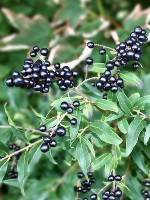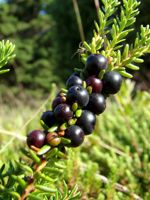Mon-Fri 9am - 5pm Mountain time
Wild Privet vs Black Crowberry
Ligustrum vulgare
Empetrum nigrum
NOT AVAILABLE THIS SEASON - MIGHT RETURN
CUSTOM GROW
Wild Privet is a fast growing ornamental shrub that is well suited for forming hedges and privacy screens. It will retain its leaves in warmer climates but drops them in colder areas. They have small white flowers, though the smell is often considered unpleasant. While the berries are inedible, they are a good food source for many bird species.
It is recommended to prune Wild Privet immediately after flowering, as it can readily self seed. It is deer and rabbit tolerant. It can grow in dry areas, on slopes, and withstand the wind making it well suited for many growing conditions.
Black Crowberry is a native evergreen shrub that forms low, spreading mats. It has unique foliage that spirals around the stem, and small dark berries, giving it visual appeal. The berries are edible, but can be acidic, so they are not generally eaten fresh. In colder climates, the berries develop a sweet-tart flavor and are often dried or used in desserts, jams, and jellies.
This hardy shrub provides food for birds and mammals, while its flowers attract pollinators such as bees. It also serves as a host plant for certain butterflies and moths. Together, these roles make it a key contributor to the health of tundra and boreal ecosystems.
In Newfoundland and Labrador, the berries are known locally as ‘blackberries’ and are enjoyed in jams, jellies, and traditional baked goods such as buns and puddings. In Scandinavia, they continue to be used in liqueurs, wines, and juices.
Wild Privet Quick Facts
Black Crowberry Quick Facts
Toxicity: If ingested, all parts of this plant will cause severe discomfort. Toxic to dogs, cats, and horses

